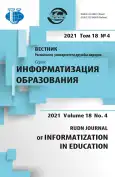Methodological approaches to the formation of a teacher’s digital competence
- Авторлар: Berkimbayev K.M.1, Niyazova G.Z.1
-
Мекемелер:
- Khoja Akhmet Yassawi International Kazakh-Turkish University
- Шығарылым: Том 18, № 4 (2021)
- Беттер: 305-313
- Бөлім: PEDAGOGY AND DIDACTICS IN INFORMATIZATION
- URL: https://journal-vniispk.ru/2312-8631/article/view/321219
- DOI: https://doi.org/10.22363/2312-8631-2021-18-4-305-313
- ID: 321219
Дәйексөз келтіру
Толық мәтін
Аннотация
Problem and goal. Digital transformation in education requires a new approach to traditional teaching methods and leads to an accelerated change in methods and forms of education. The study and selection of the possibilities of effective networked environments in the creation of digital educational content today is becoming one of the main needs for educators. This highlighted the need for highly qualified educators who have developed digital competencies and lifelong learning skills that creatively combine continuous professional growth. In this regard, it is important to determine the methodological foundations for the formation of digital competence of teachers. The purpose of the study is to concretize the features of methodological approaches to the formation of teachers’ digital competence. Methodology. General theoretical research methods were used: study and analysis of theoretical literature data; systemic structural analysis; concretization of the role of approaches to the formation of digital competence of teachers. The analysis of the features of methodological approaches to the formation of digital competence of teachers. Results. The research deals with the problem of the formation of digital competence of teachers. It is shown that the need for the development of digital competence is touched upon in many scientific works, but is not sufficiently disclosed in domestic scientific and practical research. The systematic, activity-based, axiological, personality-oriented approaches to the formation of digital competence is presented. Based on the analysis of the relevant literature, the advantages of the selected approaches in the formation of digital competencies of teachers, their main characteristics were identified. Conclusion. The approaches used as the methodological basis of the research, not only do not contradict each other, but also complement each other, act as a basis for constructing a concept and a structural-meaningful model of the formation of the teacher’s digital competence.
Авторлар туралы
Kamalbek Berkimbayev
Khoja Akhmet Yassawi International Kazakh-Turkish University
Хат алмасуға жауапты Автор.
Email: kamalbek.berkimbaev@yandex.kz
Doctor of Pedagogical Sciences, Full Professor
29 Prospekt B. Sattarhanova, Turkistan, 161200, Republic of KazakhstanGulzhan Niyazova
Khoja Akhmet Yassawi International Kazakh-Turkish University
Email: kamalbek.berkimbaev@yandex.kz
Candidate of Pedagogical Sciences, Associate Professor
29 Prospekt B. Sattarhanova, Turkistan, 161200, Republic of KazakhstanӘдебиет тізімі
- Brolpito A. Digital skills and competence, and digital and online learning. Turin; 2018.
- Gejbl E. Digital transformation of school education. International experience, fashion, global recommendations (P.A. Sergomanov, transl., ed.). Moscow: NIU VSHE Publ.; 2019. (In Russ.)
- Bilenko PN, Blinov VI, Dulinov MV, Esenina EYu, Kondakov AM, Sergeev IS. Didactic concept of digital vocational education and training. Moscow; 2020. (In Russ.)
- Cankov N, Damyanov I. Preferences of specialists in the field of education regarding the functionality of e-learning platforms in the context of blended learning. International Journal of Emerging Technologies in Learning. 2018;12(5):202-209. (In Russ.)
- Purgina EI. Methodological approaches in modern education and pedagogical science. Ekaterinburg: Ural'skij gos. ped. un-t Publ.; 2015. (In Russ.)
- Matorin SI. (ed.) System theory and system analysis. Moscow, Berlin: Direktmedia Publishing; 2019. (In Russ.)
- Baboshina EB. A value approach to the formation of a cultural person in pedagogical education. Kurgan: Izd-vo Kurganskogo gos. un-ta Publ.; 2014. (In Russ.)
- Frolova IT. (ed.) Philosophical dictionary. Moscow: Politizdat Publ.; 1987. (In Russ.)
- Fromm E. To have or not to be?. Msocow: Progress Publ.; 1990. (In Russ.)
- Ibragimova LA, Istrofilova OI. (eds.) Implementation of the value approach in education. Nizhnevartovsk: Izd-vo Nizhnevart. gos. un-ta Publ.; 2014. (In Russ.)
- Serikov VV. Personal approach in education: concepts and technologies. Volgograd: Smena Publ.; 1994. (In Russ.)
Қосымша файлдар









